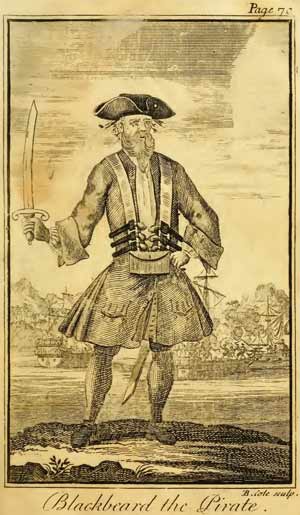Authors:
Historic Era: Era 2: Colonization and Settlement (1585-1763)
Historic Theme:
Subject:
Spring 2011 | Volume 61, Issue 1


Authors:
Historic Era: Era 2: Colonization and Settlement (1585-1763)
Historic Theme:
Subject:
Spring 2011 | Volume 61, Issue 1

Blackbeard, alias Captain Edward Thatch, in a rare contemporaneous rendering from Captain Charles Johnson's 1724 A History of the Pyrates, blockaded Charles Town (present day Charleston) for two weeks in March 1718, ransoming some of its prominent citizens.
One bright June day in 1718, a handful of fishermen off the coast of North Carolina were startled to see four vessels—a large heavily armed ship and three sloops—running before a freshening southwest breeze under a black banner emblazoned with a skeleton and a bright red bleeding heart. So the rumor was true: Blackbeard’s pirates were bearing on the inlet straight toward their village of Beaufort. The sloops carefully negotiated the hazardous shoals in single file, but their heavier flagship, Queen Anne’s Revenge, grounded on the bar, her sails flapping as the sheets were eased. The sloop Adventure, commanded by Israel Hands, cautiously tacked back down the inlet while Queen Anne’s Revenge’s crew set a kedge anchor astern in an unsuccessful effort to warp her off. Soon Adventure was hard aground too.
As afternoon faded into dusk, Queen Anne’s Revenge rolled aport, sending cannon through her bulwarks into the sea. The pirates, laden with belongings and loot, plunged into small boats or clung to planks, spars, kegs, and barrels. The burdened boats labored through the choppy inlet; those floating were either picked up or swept into the harbor by the surging tide. By nightfall the listing wrecks were abandoned to the rising wind and sea. Over the summer and fall the villagers salvaged what they could before nor’easters and hurricanes broke them up.
Blackbeard, who had served England as a privateer during Queen Anne’s War (1701–13), had arrived in North Carolina with Major Stede Bonnet, a gentleman pirate from Barbados, in the latest flaring of piracy from the West Indies. For centuries European nations had augmented their navies with privateers licensed to prey on enemy merchant vessels in time of war. When peace treaties eliminated the need for privateers, thousands would cross the narrow line back into piracy, heading for Nassau in the Bahamas, a weakly held dependency of the Lords Proprietors of Carolina. The open criminality of this new stronghold forced the British Crown to assert control by sending longtime privateer and famed navigator Captain Woodes Rogers to become the colony’s first royal governor. Rogers arrived with an offer of a royal pardon, the Act of Grace, for those who would submit, just months after Blackbeard and Bonnet had left on their latest foray.
The pirates plundered the French ship, taking 125 slaves.
That previous fall, Blackbeard and Bonnet had been cruising 100 miles east of Martinique when they encountered Captain Pierre Dosset and his 200-ton French frigate La Concorde, nine months out from Nantes and carrying more than 500 slaves from the Guinea coast of West Africa, along with stores of cocoa, copper, and gold dust. Scurvy and dysentery had thinned the 75-man crew, leaving too few able bodies to defend the ship.
The two pirate